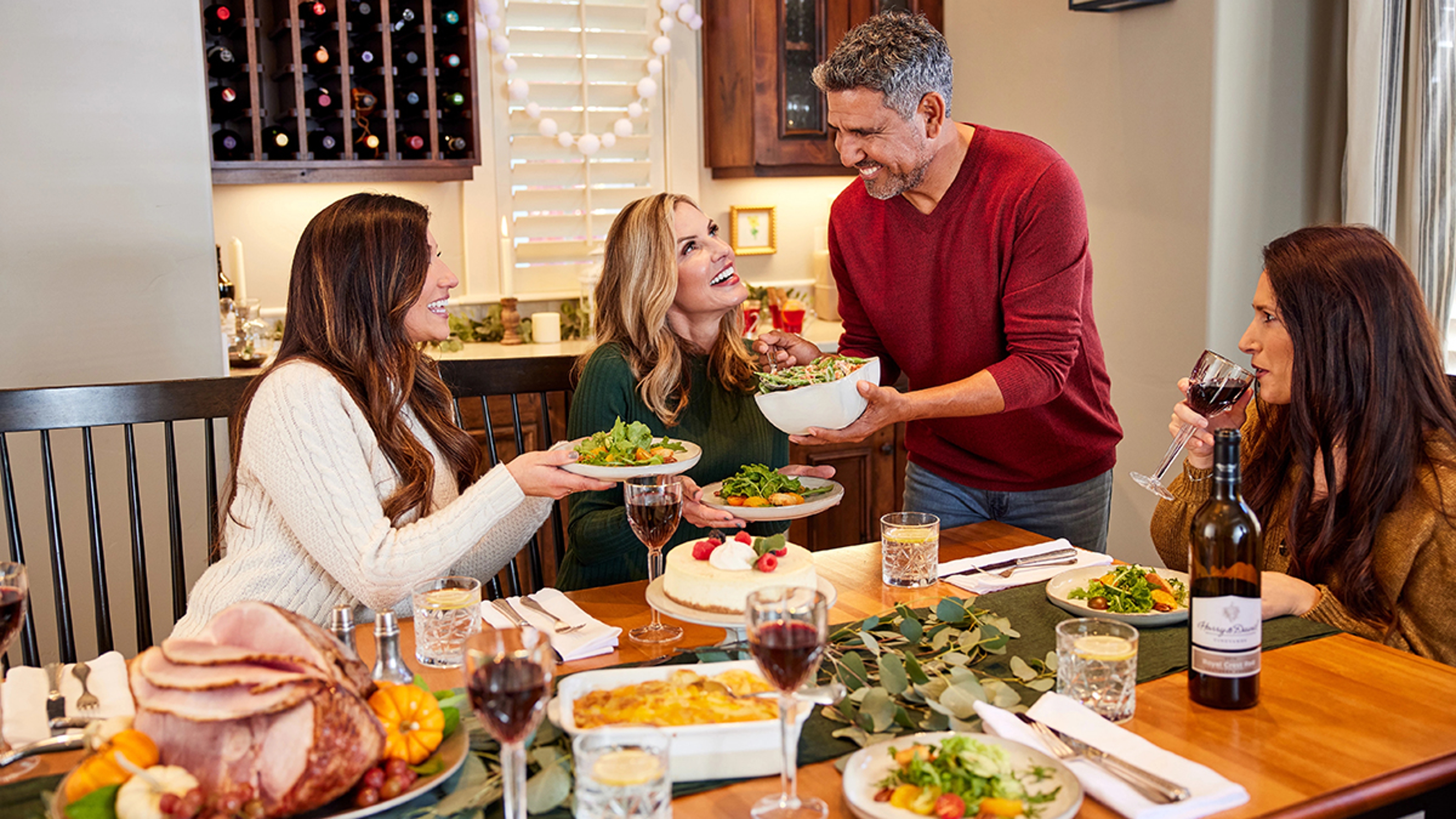How to Be a Great Dinner Guest
A full helping of stellar manners for your next social event.
Nov 09, 2022
Dinner parties may look different today than they did a long time ago, with fewer guests in gloves and footmen bringing dishes to the table. However, the basic behavior to which attendees are expected to adhere remains unchanged.
"Years ago, you'd drive up in a horse and carriage; now you drive up in an Uber. Life changes, but courtesy remains the same," says Diane Gottsman, author of Modern Etiquette for a Better Life and founder of The Protocol School of Texas.
General dinner guest etiquette guidelines still apply, and should be simple to follow:
- Don't bring a friend unannounced.
- Put the phone away.
- Thank the host as you leave.
If you're concerned, however, that your dinner party skills are a bit rusty, we've got a brief yet thorough primer on how you can be the best possible dinner guest, starting with when to RSVP to knowing when to leave.
You do want to be invited back, right?
14 rules of dinner guest etiquette
When should I RSVP?
Don't leave the host waiting too long for a head count. When you receive an invitation, check your availability and RSVP within a week, Gottsman says.
"Oftentimes, [the invitation] will give you a deadline," she says. "Sooner is always better."

What should I wear?
Yes, there is a time and place for you to rock that Hawaiian shirt, but if the invite doesn't specify what type of attire you should wear, ask the host about the dress code.
"That's a perfectly normal question," Gottsman says, "because they might say, 'Listen, come casual; I'm going to be coming from Pilates class, so I'll be in my workout clothes.'"
For cocktail attire, a shorter elegant dress should suffice; men can safely don a dark suit or sport coat and tie. Smart casual can mean a knee-length or longer skirt and heels for women, and slacks with a collared shirt for men. A dressy casual event can translate to nice pants or a skirt for women, and trousers and a dress shirt for men, possibly worn with a blazer or sports coat. Pocket squares are optional.
Does anyone still host formal soirees at their homes anymore? If so, dust off your tuxedo, fellas. Ladies, fancy attire for you means a long dress or slacks, preferably in a lush fabric, such as velvet, chiffon, or silk.
Should I mention any allergies or dietary restrictions?
Absolutely! "You can say, 'I just want to remind you I have a nut allergy. May I bring a dish I can share with everyone? I don't want to put you out,'" Gottsman says. "The host will probably say, 'I'm going to make something special for you.' Or they may say, 'Absolutely, please do!'" Great hosts are very accommodating.
Can I bring a dish?
Sure, just let the host know ahead of time that'd you'd like to bring a dessert or other item — but find out if it'd be OK, Gottsman says.
"The host has prepared a very specific menu," she says. "You don't ever want to just show up with a dish with the expectation they're going to serve it."

What should I bring for the host: Wine? A gift? Both? Something else?
Gottsman is a proponent of bringing a hostess gift as a thank you. This can be anything the person will enjoy, ranging from gourmet cake mix to a useful set of linen or paper cocktail napkins.
"If you don't know them well, just bring a bottle of wine or a box of chocolates," she says. "If it's a large gathering, put your name on it, because there are different gifts, and hosts don't know who to send a thank you to."
When should I arrive?
"You certainly have five or 10 minutes that you can run late, but you don't have 15 or 20 — and you never arrive early," Gottsman says.
While being on time to a dinner party is always advisable, the host may be busy attending to last-minute details in the moments beforehand, so try not to show up early — something a survey conducted by Joybird found hosts view as one of the worst guest faux pas.
"Stop at a store, park in a parking lot; don't show up and sit in front of the house because that still puts pressure on the host," Gottsman says.
Can I use my phone at the party?
Avoid interacting with your phone. Keep it out of sight and turn on the do not disturb setting, if possible.
"Parents will say, 'My babysitter may be calling,'" Gottsman says. "If you have to have it near you, it needs to be off the table, on your lap, on vibrate. We don't want to see the phone. It's distracting, and you're not going to be texting or taking calls unless it's an emergency."
Should I let the host start conversations?
Coming to a dinner party equipped with conversation fodder can facilitate interactions with other guests.
"Part of the duty of a good guest is to appear engaged and interested," Gottsman says. "Make sure you're asking questions, listening to conversations; think about travel, movies, pets. There are a multitude of topics you can bring up."
Can I eat as much as I want?
If guests are told to serve themselves during the meal, Gottsman says you are free to help yourself to a second portion after everybody has had their first.
"But don't go back for thirds," she says. "You don't want to appear to be a glutton."

What if I don't like the meal?
If, conversely, you're not crazy about the food, just eat what you can and act positive if asked about it.
"If people say, 'You didn't eat that much,' you don't have to say, 'I don't like it,'" Gottsman says. "Say, 'Oh gosh, it was such generous portions I couldn't finish it, but it was delicious.'"
Who cleans up?
After the meal, offering to help clear the table is a thoughtful move.
"If they say, 'No, no, please have a seat, I'm going to do this myself,' let them," Gottsman says. "Maybe they don't want you to go into the kitchen; they want to handle their china themselves. You have to follow the lead of the host and respect whatever their response is."
When should I leave?
Learn to read the room, Gottsman says.
"The best time to leave is before everybody starts to," she says. "After dessert, wait a few minutes; you'll know when the party is winding down. You never want to be the last one walking out the door."
How can I thank the host afterward?
Sending a note thanking the host for a great dinner is a nice gesture.
"Nothing is as thoughtful as a handwritten note," Gottsman says. "You can even give them a call — and you can do both, if you'd like."
Are there different rules depending on your relationship to the host?
If the host is a good friend, reaching out the next day informally via text may be fine. Although it's often easy to take a more casual approach with family, consider calling relatives after a dinner party to thank them for having you over.
"We tend to be less polite to our family members, and we should treat our family as nicely as we would our best client," Gottsman says. "You want to follow up the next day and let them know how special it was to spend time with them."
What if I make a faux pas?
In addition to tossing any gum you might be chewing before entering the party, Gottsman recommends trying to make the host's evening a bit less stressful by being social.
"Don't monopolize the host's time, because they have a lot to do," she says. "Make sure you're talking to all guests, not just the people you know. Make it a point to introduce yourself to people you haven't met because it makes the host feel comfortable. The host is always worried people aren't having fun."
.svg?q=70&width=384&auto=webp)







